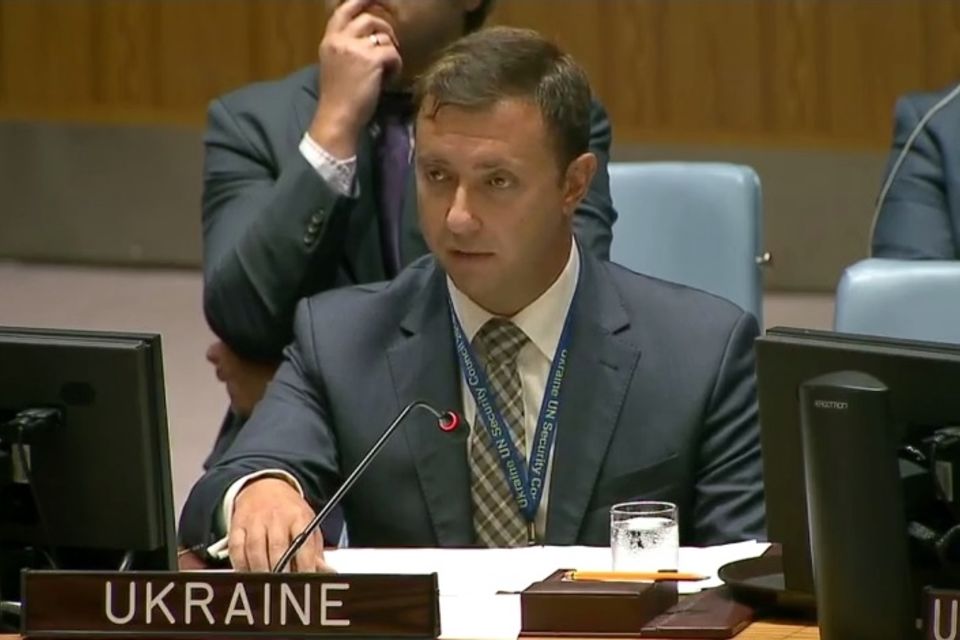Statement by the delegation of Ukraine at the UNSC briefing on Preventing Terrorists from Acquiring Weapons

Mr. President,
I would like to start by thanking the delegation of Egypt for convening today’s meeting.
My thanks also go to the briefers for their insightful inputs to our discussion that reconfirmed the complexity and importance of the problem in question.
Mr. President,
So far this year we have witnessed a rather effective international campaign aimed at dismantling ISIL’s core in the Middle East and weakening its presence in other parts of the world, mainly due to resolute military efforts on the ground.
However, it could not have been achieved without depriving terrorists from sources of financing and, especially, from weapons supplies. Significant progress has been made in Iraq and Syria, as well as certain parts of Africa.
Nowadays the persistence of terrorist threat makes it imperative to strengthen existing mechanisms for the sake of prohibiting the acquisition, production, storage, transfer or use of weapons by terrorist groups.
In this context, we consider today’s resolution, which introduces a multifaceted approach linking two dimensions — counter-terrorism and arms control, as an important step in this direction.
Though this legal instrument mainly focuses on small arms and light weapons as a primary tool used by terrorists in various regions of the world, there are also alarming signs that even more sophisticated weapons are within reach of determined terrorist groups.
To prevent terrorists from acquiring any weapons strict measures should be implemented at the national level to strengthen export and border controls, in particular regulations on transfers of weapons and other sensitive military equipment or materials, as well as to bolster financial intelligence cooperation.
Inter alia, this relates to ensuring the protection and security of national stockpiles; addressing illicit brokering activities; thorough checking of end-users’ backgrounds; tracing weapons’ trade roots and identifying countries known as trans-shipment points for terrorist groups; enhancing border security, as well as tracking suspicious money transfers.
We consider the UN Programme of Action on SALW, the International Tracing Instrument and the Arms Trade Treaty as important instrument tools that contribute to this process and can pave the way for solving the problem of illicit trafficking of weapons in all its aspects, reduce the scale of terrorist violence and end the spread of this scourge worldwide.
Mr. President,
The international regime, aimed at curbing arms supply to terrorists, runs into a problem when states, who are supposed to uphold it, turn out to be in breach of their international obligations and commitments in this regard.
One of the most telling cases of our times is the continuing flooding of the occupied territories in the east of Ukraine with all kinds of weapon systems, all coming from the neighboring state. Over 400 battle tanks, 840 armoured personnel vehicles, 200 multiple launch rocket systems, 730 artillery systems and 400 air defense units have been provided to terrorist organizations operating there.
These deadly supplies have been used also to conduct devastating terrorist attacks, including, for example, the shooting down of Malaysian Airlines Flight MH17, with 298 innocent civilians on board.
The rhetorical question is: How did the terrorist organizations in Ukraine get weapons that often surpass armament stocks of many states on the European continent? Or why do not terrorists run out of diesel and munitions?
Mr. President,
Today, we adopted a document that clearly defines the scope of states’ obligations in eliminating the supply of weapons to terrorists.
Having unanimously backed this decision of the Security Council, all countries around this table undertook to respect the obligation not to support and supply terrorists with weapons.
We expect that all countries, first and foremost, those that voted for today’s resolution, will remain faithful to both the letter and spirit of relevant norms of international law.
In conclusion, I would like to emphasize the importance of bringing to justice those who knowingly engage in providing terrorists with weapons, funds and other types of assets. The suppliers of weapons, other sponsors or masterminds of terrorist activities should bear no less responsibility than those who perpetrate the crimes on the ground.
I thank you.
